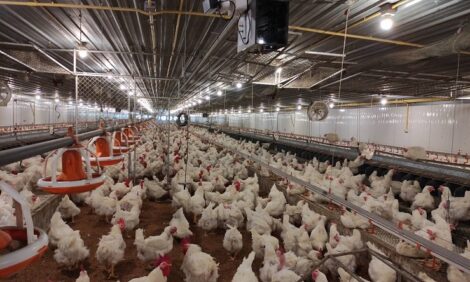



Soil Association Calls for Nicarbazin Ban
UK - The Soil Association wants the poultry feed additive, nicarbazin (Maxiban) to be banned.The Soil Association has made the following statement regarding the use of nicarbazin in poultry feeds:
The Food Standards Agency has failed to support a ban on a poultry feed additive which contains the antimicrobial drug, nicarbazin.
Nicarbazin residues have been a persistent problem in a high proportion of UK-produced chicken liver and in some chicken meat, but can also be found in more than a quarter of a million eggs eaten each day by British consumers.
An EU scientific review found that a safe level for residues could not be established because the company producing the feed additive, Elanco, had failed to provide sufficient scientific evidence to prove that the chemical is not capable of causing damage to genes, genetic mutations, birth deformities or malformations.
Despite the findings of their scientific advisers, the European Commission and the UK's Veterinary Medicines Directorate (VMD) have used a legal loophole to permit the continued routine use of nicarbazin in the intensive poultry industry.
The FSA and the industry are trying to reduce the risk through a voluntary approach, issuing an advisory leaflet [see link below], and reminding farmers that they need to ensure that the drug withdrawal period before chickens are killed is fully respected. However, a similar leaflet has been sent to poultry producers several times before. The fundamental problem is that the recommendations do not stop bored chickens eating their own droppings and recycling nicarbazin during the five days before slaughter when their feed is supposed to be entirely free from it.
The latest figures from the VMD indicate that, in 2008, nine per cent of chicken liver were still contaminated with residues above official safety limits (42 out of 475 samples tested). In 17 per cent of the cases where residues were found, they were five times above the safety limit, requiring a Defra farm investigation. Two of the residues were the highest found since 1999, with one of these being 21 times above safety limits. Residues of nicarbazin were also found in one per cent of eggs.
The Soil Association has repeatedly called for nicarbazin to be banned and accuses the FSA and veterinary medicines regulators of weak and ineffective regulation.
In a letter to Dame Deirdre Hutton, the outgoing Chair of the FSA, Soil Association Policy Adviser, Richard Young says, "By issuing a pathetic leaflet instead of demanding a ban on the poultry feed additive nicarbazin, you are failing in your most fundamental duty to protect consumers from dangerous chemicals in food."
Richard Young added, "This is a serious and persistent food-contamination issue which puts the public's health at risk. It is totally unacceptable that regulators are using a loophole to avoid taking action against the financial interests of the pharmaceutical and intensive-livestock industries. It is precisely this kind of cosiness with industry the FSA are meant to be regulating."
A scientific review of nicarbazin's safety was carried out by one of the European Food Safety Authority's scientific advisory committees in 2003. It found that many of the toxicological studies carried out on nicarbazin had been performed in the 1950s and did not meet current standards.
Further Reading
| - | Go to our previous news item - on the new advisory leaflet on the use of nicarbazin, by clicking here. |








